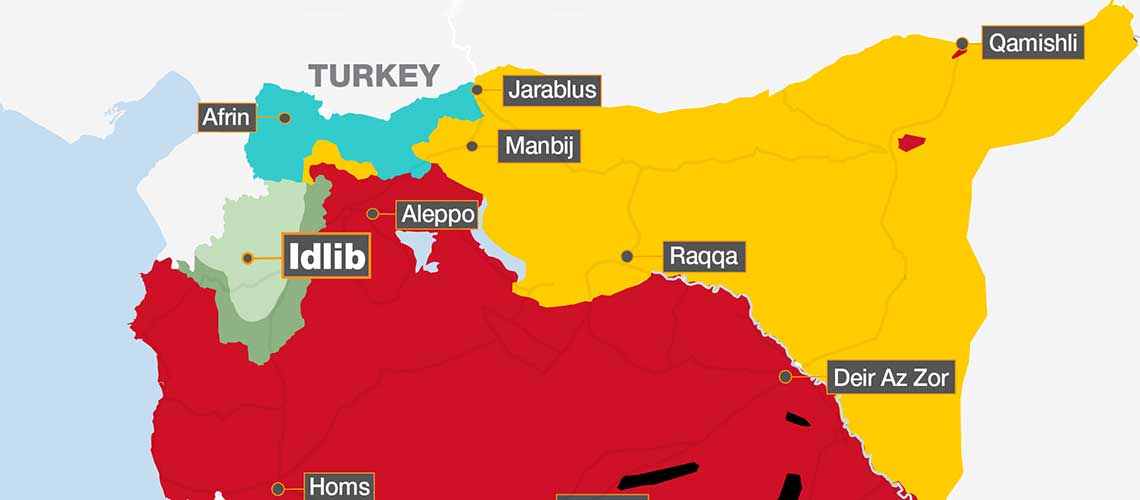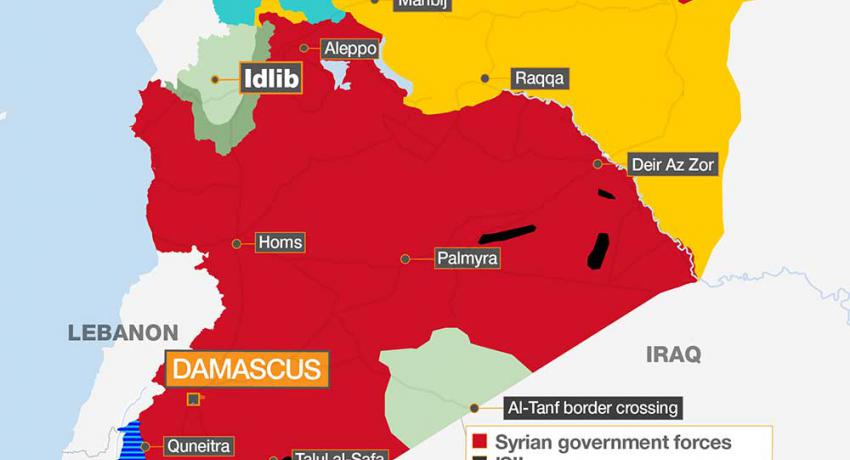Source: Liveuamap
Editor’s Note
A Semi-Autonomous Kurdish State in Syria is being Established
It seems more and more clear day by day that Syria will not be able to keep its unity. A Kurdish semi-autonomous state is being established in Northern Syria.
Although Assad regime in Syria rejects it, Syria does not have enough power and resources to start another large scale war against the Kurdish forces (Syrian Democratic Forces — SDF) backed with USA.
The EU does not have a specific policy with countries like the UK, France and Germany remaining wedded to the U.N.-led Geneva process while others likely Italy, Poland and Hungary — largely driven by nationalist domestic agendas — want Europe to re-engage with Assad in order to start sending refugees back to Syria.
Turkey is clearly against the establishment of a Kurdish State in Northern Syria. However, Turkish politics gives mixed signals about Syria as well. It is not clear how Turkey will manage to avoid it while it has serious disagreements with USA, Syria and Kurdish Forces in Syria at the same time.
A Kurdish Autonomous Region in Northern Syria
The readers of this journal may remember that we several times mentioned that Syria will be divided into at least two countries. It is getting more clear that this is becoming a fact rather than a hypothesis.
A new Kurdish semi-autonomous regions is being established in Northern Syria with the support of USA. The scenario happened in Iraq as well. Kurds had their own autonomous region which will be an independent country in a few years in Iraq with support of USA and EU as well.
Yellow highlighted areas presents the region controlled by Kurdish Forces which is called Syrian Democratic Forces. Of course, when you can a force as a democratic, one may as-sume that this military force includes all Syrian ethnic groups. But it only includes Kurdish ones and fight to secure an autonomous region for Kurds in Syria. So, SDF is a separation force in Syria.
Indeed, The leader of the SDF Mazlum Kobane has openly stated his goal of establishing a semi-autonomous state within a federal Syria. The Assad government has consistently rejected that proposition and insisted on restoration of full sovereignty. The SDF now control a large portion of the country’s oil and natural gas reserves which is a strong bargaining chip but also makes them a target. The SDF also control the Tabqa Dam, the largest source of electricity in Syria which recently got repaired & reconnected to the national grid.
The EU does not have a specific policy with countries like the UK, France and Germany remaining wedded to the U.N.-led Geneva process while others likely Italy, Poland and Hungary — largely driven by nationalist domestic agendas — want Europe to re-engage with Assad in order to start sending refugees back to Syria.
Will Assad regime lets its country to be divided? As of now, Assad regime does not have any power or resources to open another large scale war while being very busy in Idlib and financial problems. At the same time, Kurdish forces also are not intended to have a fight with Assad regime. Overall, it looks that both side is in a kind of undeclared agreement.
One another important player, Turkey s is concerned about the establishment of a Kurdish autonomous region in Northern Syria. But it is not very clear how Turkey will avoid it given that country has serious disagreements with USA, Kurds (in and outside of Turkey) and Syrian regime. The only friend of Turkey is Russia among the key players in Syria. But, Russia will not be included in resolving of the issues between Kurdish forces, Turkey and Syrian regime.
Overall, as of today, it seems Assad regime will not be able to secure unity of Syria unless a miracle happens. Actually, if Turkey shakes hands with Syrian regime and agree about unity of Syria, then they may jointly suppress the Kurdish Forces. It is more logical if Turkey and Syria gets closer given that these two countries have strong historical friendship. In addition to this, it is estimated that there are around 5 million Syrian refugees in Turkey. There has been tension between Syrian refugees and Turkish host communities for a while. In line with this, Turkish government has started change it policies about Syrian refugees as well. Such as, Turkey is not allowing more refugee flows into Turkey anymore. Also, Turkish Government calls Syrians to go back to their country.
However, at the same time, there are around 2 million Syrian civilians are squeezed between Syrian Regime forces and Jihadist terrorist groups in Idlib. Syrian regime will not let these jihadist groups to be based in its territory. As a result, Syrian regime started a large scale offense against these groups recently as well. As a results, there are more than 100 thousands Syrians escaped to the Turkey border area. But, they are not allowed to get into Turkey.
It is a clear advantage of both Turkey and Syria, if both countries start talking and finding common solutions about status of Northern Syria, status of the refugees and re-establishment of Governance in Syria. Turkey has strong capacity to help Syria to re-establish the country together with Russia, EU and UN.
We will continue to monitor the situation in Syria. We only hope that no further humanitarian crises will happen in Syria in near future.


